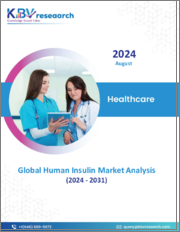
|
시장보고서
상품코드
1627676
인간 인슐린 시장 : 예측(2025-2030년)Human Insulin Market - Forecasts from 2025 to 2030 |
||||||
인간 인슐린 시장은 연평균 3.28%의 CAGR로 성장하여 2025년 233억 3,445만 달러에서 2030년 274억 2,171만 달러의 시장 규모에 도달할 것으로 예상됩니다.
인슐린은 체내 당 수치를 조절하는 호르몬입니다. 당뇨병은 혈당 또는 당분 수치가 비정상적으로 상승하는 만성 대사 질환입니다. 현재 당뇨병에는 두 가지 유형이 있는데, 1형 당뇨병은 췌장의 베타세포가 인슐린을 분비하지 못하는 것이고, 제2형 당뇨병은 체내 세포가 인슐린 분비에 대한 감수성이 저하된 것입니다. 앉아서 생활하는 생활습관이 확산됨에 따라 당뇨병 유병률은 인슐린 시장에서 급증할 것으로 예상됩니다. 또한, 신흥국에서의 양호한 상환 추세도 전체 시장 성장에 기여할 것으로 예상됩니다.
인간 인슐린 시장 촉진요인
- 당뇨병 환자 증가는 인간 인슐린 시장 성장에 기여합니다.
당뇨병은 만성 대사성 질환으로 혈중 저혈당으로 인한 혈당치의 상승으로 정의됩니다. 당뇨병은 만성 대사성 질환으로 혈중 포도당 수치가 상승하여 저혈당을 유발하는 만성 대사성 질환입니다. 인간에게는 인간 인슐린이 있으며, 개별화 치료, 임상 치료에서 인슐린 보충, 질병 치료 및 통제를위한 전문 치료에 널리 사용됩니다. 그러나 인슐린에 대한 수요는 체내에서 형성되지 않는 필수 인슐린을 공급하여 혈당을 조절하고 고혈당을 예방하는 제 1 형 당뇨병 치료를 위한 약물의 소비 증가로 인해 인슐린에 대한 수요가 더욱 촉진되고 있습니다. 경구용으로 사용되며, 포도당 흡수를 개선하고 체내 인슐린 양을 증가시키도록 설계되었습니다.
또한, 건강한 췌장의 기저 인슐린 분비를 모방하여 하루 종일 지속적으로 인슐린을 공급하는 인슐린 펌프 요법 제품에 대한 수요가 증가함에 따라 시장도 확대되고 있습니다. 또한, 인간 인슐린은 수술 전이나 중환자실에서 고혈당 및 저혈당 전환을 방지하여 수술 합병증을 줄이는데 매우 중요하며, 따라서 수술 합병증을 줄이는데도 필수적입니다.
인간 인슐린 시장의 지리적 전망:
- 북미는 예측 기간 동안 비약적인 성장을 이룰 것입니다.
북미에서는 앉아서 생활하는 생활습관으로 인한 당뇨병 유병률이 높기 때문에 미국이 세계 인슐린 시장을 장악하고 있습니다. 미국에서는 국내 인슐린 제제 제조업체가 매출의 약 절반을 차지하고 있기 때문에 비용 요인이 가장 큰 관심사입니다. 미국은 장기지속형 인슐린 제제 란타스의 전 세계 매출의 대부분을 차지하고 있습니다. 많은 당뇨병 치료제 제조업체들은 미국을 세계 매출 증대를 위한 중요한 시장으로 간주하고 있습니다. 란타스는 세계에서 가장 인기 있는 기저 인슐린 제제로 미국 시장을 독점하고 있습니다.
이 보고서를 구매해야 하는 이유
- 통찰력 있는 분석 : 고객 부문, 정부 정책 및 사회경제적 요인, 소비자 선호도, 산업별, 기타 하위 부문에 초점을 맞추고 주요 지역뿐만 아니라 신흥 지역까지 포괄하는 상세한 시장 인사이트를 얻을 수 있습니다.
- 경쟁 상황 : 세계 주요 기업들이 채택하고 있는 전략적 전략을 이해하고, 적절한 전략을 통한 시장 침투 가능성을 파악할 수 있습니다.
- 시장 촉진요인과 미래 동향 : 역동적인 요인과 매우 중요한 시장 동향, 그리고 이들이 향후 시장 발전을 어떻게 형성할 것인지에 대해 알아봅니다.
- 실행 가능한 제안 : 역동적인 환경 속에서 새로운 비즈니스 스트림과 수익을 발굴하기 위한 전략적 의사결정에 인사이트를 활용합니다.
- 다양한 사용자에 대응 : 스타트업, 연구기관, 컨설턴트, 중소기업, 대기업에 유익하고 비용 효율적입니다.
어떤 용도로 사용되는가?
산업 및 시장 인사이트, 사업 기회 평가, 제품 수요 예측, 시장 진입 전략, 지리적 확장, 설비 투자 결정, 규제 프레임워크와 영향, 신제품 개발, 경쟁의 영향
분석 범위
- 과거 데이터 및 예측(2022-2030년)
- 성장 기회, 도전과제, 공급망 전망, 규제 프레임워크, 고객 행동, 트렌드 분석
- 경쟁사 포지셔닝, 전략 및 시장 점유율 분석
- 매출 성장률 및 예측 분석 : 부문별/지역별(국가별)
- 기업 프로파일링(전략, 제품, 재무정보, 주요 동향 등)
목차
제1장 소개
- 시장 개요
- 시장 정의
- 분석 범위
- 시장 세분화
- 통화
- 가정
- 기준 연도와 예측 연도 타임라인
- 이해관계자에 대한 주요 이점
제2장 분석 방법
- 분석 디자인
- 분석 프로세스
제3장 주요 요약
- 주요 조사 결과
- CXO의 견해
제4장 시장 역학
- 시장 성장 촉진요인
- 시장 성장 억제요인
- Porter's Five Forces 분석
- 업계의 밸류체인 분석
- 애널리스트의 견해
제5장 인간 인슐린 시장 : 제품 종류별
- 소개
- 속효성 인슐린
- 지속성 인슐린
- 복합 인슐린
- 바이오시밀러
- 기타
제6장 인간 인슐린 시장 : 용도별
- 소개
- 1형 당뇨병
- 2형 당뇨병
제7장 인간 인슐린 시장 : 유통 채널별
- 소개
- 병원
- 소매 약국
- 기타
제8장 인간 인슐린 시장 : 지역별
- 소개
- 북미
- 제품 종류별
- 용도별
- 유통 채널별
- 국가별
- 남미
- 제품 종류별
- 용도별
- 유통 채널별
- 국가별
- 유럽
- 제품 종류별
- 용도별
- 유통 채널별
- 국가별
- 중동 및 아프리카
- 제품 종류별
- 용도별
- 유통 채널별
- 국가별
- 아시아태평양
- 제품 종류별
- 용도별
- 유통 채널별
- 국가별
제9장 경쟁 환경과 분석
- 주요 기업과 전략 분석
- 시장 점유율 분석
- 기업 인수합병(M&A), 합의, 사업 협력
- 경쟁 대시보드
제10장 기업 개요
- Eli Lilly and Company
- Sanofi
- Novo Nordisk A/S
- Biocon
- Boehringer Ingelheim
- Tonghua Dongbao Pharmaceutical Co.
- Wockhardt
- Julphar
- Gan & Lee Pharmaceuticals
- Biocon
- Bioton
- Novo Nordisk Pharmatech
- Sigma-Aldrich
- CDH Fine Chemical
- BioGems
The human insulin market is expected to grow at a CAGR of 3.28%, reaching a market size of US$27,421.71 million in 2030 from US$23,334.45 million in 2025.
Insulin is the hormone that controls sugar levels in the body. Diabetes is a chronic metabolic condition with an abnormal increase in blood glucose or sugar levels. Currently, it has two types. In type 1 diabetes, the pancreatic beta cells are unable to secrete insulin, whereas in type 2, the cells of the body become less sensitive to insulin secretion. With the increasing prevalence of sedentary lifestyles, the incidence of diabetes is anticipated to surge in the insulin market. In addition, favorable reimbursement trends in developed countries are expected to contribute to overall market growth.
Human Insulin Market Drivers
- Rising cases of diabetes are contributing to the human insulin market growth
Diabetes is a chronic metabolic ailment that has been defined through increased blood glucose levels in the blood hypoglycemia. Humans have human insulin, which is widely used in individualized treatment, insulin replacement in clinical therapy, and specialty treatment to treat and control the disease. However, the demand for insulin is further propelled by the increasing consumption of the drug to treat type 1 diabetes, which controls blood sugar levels and prevents hyperglycemia by providing the essential insulin that does not form in the body. It is used orally and is designed to improve glucose uptake and increase the amount of insulin in the body.
Further, the market is also expanding due to the increasing demand for insulin pump therapy products that provide a continuous flow of insulin all day, mimicking the basal insulin secretion by a healthy pancreas. In addition to that, human insulin is also very important in preventing high or low-glucose shifts in preoperative and critical care environments and, hence, is imperative in lessening surgical complications.
Human Insulin Market Geographical Outlook:
- North America is witnessing exponential growth during the forecast period.
The high prevalence of diabetes in North America, which is caused by a sedentary lifestyle, has resulted in the United States gaining a stranglehold on the global human insulin market. The cost factor is the biggest concern in the US since domestic insulin producers receive about half of their revenue. The United States accounts for most of the global sales of Lantus, a long-acting insulin. Many diabetes medication manufacturers view the country as a key market to boost global sales. Lantus is the most popular basal insulin worldwide and holds a monopoly on the US market.
Reasons for buying this report:-
- Insightful Analysis: Gain detailed market insights covering major as well as emerging geographical regions, focusing on customer segments, government policies and socio-economic factors, consumer preferences, industry verticals, other sub- segments.
- Competitive Landscape: Understand the strategic maneuvers employed by key players globally to understand possible market penetration with the correct strategy.
- Market Drivers & Future Trends: Explore the dynamic factors and pivotal market trends and how they will shape up future market developments.
- Actionable Recommendations: Utilize the insights to exercise strategic decision to uncover new business streams and revenues in a dynamic environment.
- Caters to a Wide Audience: Beneficial and cost-effective for startups, research institutions, consultants, SMEs, and large enterprises.
What do businesses use our reports for?
Industry and Market Insights, Opportunity Assessment, Product Demand Forecasting, Market Entry Strategy, Geographical Expansion, Capital Investment Decisions, Regulatory Framework & Implications, New Product Development, Competitive Intelligence
Report Coverage:
- Historical data & forecasts from 2022 to 2030
- Growth Opportunities, Challenges, Supply Chain Outlook, Regulatory Framework, Customer Behaviour, and Trend Analysis
- Competitive Positioning, Strategies, and Market Share Analysis
- Revenue Growth and Forecast Assessment of segments and regions including countries
- Company Profiling (Strategies, Products, Financial Information, and Key Developments among others)
The human insulin market is segmented and analyzed as follows:
By Product Type
- Rapid-Acting Insulin
- Long-Acting Insulin
- Combination Insulin
- Biosimilar
- Others
By Application
- Type 1 Diabetes Mellitus
- Type 2 Diabetes Mellitus
By Distribution Channel
- Hospitals
- Retail Pharmacies
- Others
By Geography
- North America
- USA
- Canada
- Mexico
- South America
- Brazil
- Argentina
- Others
- Europe
- United Kingdom
- Germany
- France
- Italy
- Spain
- Others
- Middle East and Africa
- Saudi Arabia
- UAE
- Others
- Asia Pacific
- China
- Japan
- India
- South Korea
- Australia
- Others
TABLE OF CONTENTS
1. INTRODUCTION
- 1.1. Market Overview
- 1.2. Market Definition
- 1.3. Scope of the Study
- 1.4. Market Segmentation
- 1.5. Currency
- 1.6. Assumptions
- 1.7. Base and Forecast Years Timeline
- 1.8. Key Benefits to the Stakeholder
2. RESEARCH METHODOLOGY
- 2.1. Research Design
- 2.2. Research Processes
3. EXECUTIVE SUMMARY
- 3.1. Key Findings
- 3.2. CXO Perspective
4. MARKET DYNAMICS
- 4.1. Market Drivers
- 4.2. Market Restraints
- 4.3. Porter's Five Forces Analysis
- 4.3.1. Bargaining Power of Suppliers
- 4.3.2. Bargaining Power of Buyers
- 4.3.3. Threat of New Entrants
- 4.3.4. Threat of Substitutes
- 4.3.5. Competitive Rivalry in the Industry
- 4.4. Industry Value Chain Analysis
- 4.5. Analyst View
5. HUMAN INSULIN MARKET BY PRODUCT TYPE
- 5.1. Introduction
- 5.2. Rapid-Acting Insulin
- 5.3. Long-Acting Insulin
- 5.4. Combination Insulin
- 5.5. Biosimilar
- 5.6. Others
6. HUMAN INSULIN MARKET BY APPLICATION
- 6.1. Introduction
- 6.2. Type 1 Diabetes Mellitus
- 6.3. Type 2 Diabetes Mellitus
7. HUMAN INSULIN MARKET BY DISTRIBUTION CHANNEL
- 7.1. Introduction
- 7.2. Hospitals
- 7.3. Retail Pharmacies
- 7.4. Others
8. HUMAN INSULIN MARKET BY GEOGRAPHY
- 8.1. Introduction
- 8.2. North America
- 8.2.1. By Product Type
- 8.2.2. By Application
- 8.2.3. By Distribution Channel
- 8.2.4. By Country
- 8.2.4.1. USA
- 8.2.4.2. Canada
- 8.2.4.3. Mexico
- 8.3. South America
- 8.3.1. By Product Type
- 8.3.2. By Application
- 8.3.3. By Distribution Channel
- 8.3.4. By Country
- 8.3.4.1. Brazil
- 8.3.4.2. Argentina
- 8.3.4.3. Others
- 8.4. Europe
- 8.4.1. By Product Type
- 8.4.2. By Application
- 8.4.3. By Distribution Channel
- 8.4.4. By Country
- 8.4.4.1. United Kingdom
- 8.4.4.2. Germany
- 8.4.4.3. France
- 8.4.4.4. Italy
- 8.4.4.5. Spain
- 8.4.4.6. Others
- 8.5. Middle East and Africa
- 8.5.1. By Product Type
- 8.5.2. By Application
- 8.5.3. By Distribution Channel
- 8.5.4. By Country
- 8.5.4.1. Saudi Arabia
- 8.5.4.2. UAE
- 8.5.4.3. Others
- 8.6. Asia Pacific
- 8.6.1. By Product Type
- 8.6.2. By Application
- 8.6.3. By Distribution Channel
- 8.6.4. By Country
- 8.6.4.1. China
- 8.6.4.2. Japan
- 8.6.4.3. India
- 8.6.4.4. South Korea
- 8.6.4.5. Indonesia
- 8.6.4.6. Taiwan
- 8.6.4.7. Others
9. COMPETITIVE ENVIRONMENT AND ANALYSIS
- 9.1. Major Players and Strategy Analysis
- 9.2. Market Share Analysis
- 9.3. Mergers, Acquisitions, Agreements, and Collaborations
- 9.4. Competitive Dashboard
10. COMPANY PROFILES
- 10.1. Eli Lilly and Company
- 10.2. Sanofi
- 10.3. Novo Nordisk A/S
- 10.4. Biocon
- 10.5. Boehringer Ingelheim
- 10.6. Tonghua Dongbao Pharmaceutical Co.
- 10.7. Wockhardt
- 10.8. Julphar
- 10.9. Gan & Lee Pharmaceuticals
- 10.10. Biocon
- 10.11. Bioton
- 10.12. Novo Nordisk Pharmatech
- 10.13. Sigma-Aldrich
- 10.14. CDH Fine Chemical
- 10.15. BioGems



















